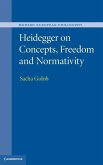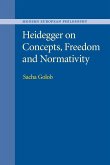Short description/annotation
This book discusses much of Heidegger's later thought on metaphysics as 'ontotheology', education, and National Socialism.
Main description
Heidegger is now widely recognized as one of the most influential and controversial philosophers of the twentieth century, yet much of his later philosophy remains shrouded in confusion and controversy. Restoring Heidegger's understanding of metaphysics as 'ontotheology' to its rightful place at the center of his later thought, this book demonstrates the depth and significance of his controversial critique of technology, his appalling misadventure with Nazism, his prescient critique of the university, and his important philosophical suggestions for the future of higher education. It will be required reading for those seeking to understand the relationship between Heidegger's philosophy and National Socialism, as well as the continuing relevance of his work.
Table of contents:
1. Ontotheology(?)33; understanding Heidegger's deconstruction of metaphysics; 2. Understanding ontotheology as the basis for Heidegger's critique of technology; 3. Heidegger and the politics of the university; 4. Heidegger's mature vision of ontological education or: how we become what we are.
This book discusses much of Heidegger's later thought on metaphysics as 'ontotheology', education, and National Socialism.
Main description
Heidegger is now widely recognized as one of the most influential and controversial philosophers of the twentieth century, yet much of his later philosophy remains shrouded in confusion and controversy. Restoring Heidegger's understanding of metaphysics as 'ontotheology' to its rightful place at the center of his later thought, this book demonstrates the depth and significance of his controversial critique of technology, his appalling misadventure with Nazism, his prescient critique of the university, and his important philosophical suggestions for the future of higher education. It will be required reading for those seeking to understand the relationship between Heidegger's philosophy and National Socialism, as well as the continuing relevance of his work.
Table of contents:
1. Ontotheology(?)33; understanding Heidegger's deconstruction of metaphysics; 2. Understanding ontotheology as the basis for Heidegger's critique of technology; 3. Heidegger and the politics of the university; 4. Heidegger's mature vision of ontological education or: how we become what we are.
"By far the deepest and the most illuminating account of the relation between Heidegger's philosophy and his politics yet offered. Thomson shows convincingly how Heidegger's political engagement followed from his understanding of the role of philosophy in the university and how what was most original and important in his later thinking emerged as a result of this tragic involvement."
-Hubert Dreyfus, University of California, Berkeley
-Hubert Dreyfus, University of California, Berkeley








